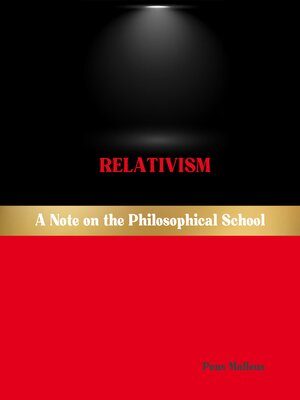Relativism
audiobook (Unabridged) ∣ A Note on the Philosophical School · Western Philosophical Schools
By Pons Malleus

Sign up to save your library
With an OverDrive account, you can save your favorite libraries for at-a-glance information about availability. Find out more about OverDrive accounts.
Find this title in Libby, the library reading app by OverDrive.



Search for a digital library with this title
Title found at these libraries:
| Library Name | Distance |
|---|---|
| Loading... |
This audiobook is narrated by a digital voice.
Often dismissed, frequently misunderstood, and occasionally celebrated, relativism stands at the crossroads of ethics, epistemology, culture, and truth. It challenges the assumption that there are absolute, universal principles—whether in morality, knowledge, or meaning—and instead contends that what we know, value, and believe is always situated: within a context, a perspective, a language, a tradition.
To many, relativism is a threat. It is accused of eroding certainty, undermining objectivity, and opening the gates to moral permissiveness or intellectual chaos. To others, it is liberating—an honest recognition of the complexity of human experience, a stance against dogmatism, and an invitation to humility and tolerance in the face of diversity.
Relativism, however, is not a monolith. Over the centuries, it has taken various forms and sparked intense debate across disciplines. In ancient Greece, Protagoras famously declared, "Man is the measure of all things," laying an early foundation for relativistic thought. In modern philosophy, thinkers from Nietzsche to Wittgenstein, from Foucault to Rorty, have grappled with the implications of relativism for truth, power, and language. In anthropology, cultural relativism has become a key principle in understanding and respecting the practices of different societies. In ethics, moral relativism continues to divide scholars over whether there can be any universal standard of right and wrong.
This audiobook is not a polemic for or against relativism. Rather, it aims to clarify what relativism is, where it arises, and how it has shaped—and been shaped by—philosophical reflection. It seeks to distinguish between the varieties of relativism, and to examine the arguments that support or challenge each. It asks: Is all knowledge truly relative to the knower? Can we maintain a commitment to cultural understanding without surrendering to moral paralysis?







